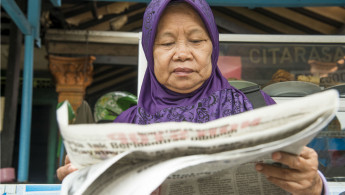Malaysia proposes ten-year term for fake news ahead of elections
Human rights activists and critics have slammed the move describing it as a draconian bid to crack down on dissent.
Claims of a multibillion-dollar corruption scandal have followed the Prime Minister Najib Razak, and activists fear the new laws could be used as a fig leaf for damning news reports and critical opinions on government misconduct.
If the proposed legislation is approved by parliament, it will penalise those who create, offer, circulate, print or publish "fake news" or publications containing "fake news" with a ten-year jail term, a fine of up to 500,000 ringgit ($128,000) or both.
The bill defines fake news as "any news, information, data and reports which is, or are, wholly or partly false whether in the form of features, visuals or audio recordings or in any other form capable of suggesting words or ideas".
This will apply to all mediums, and can be applied on foreigners outside Malaysia if it can be deemed to have an affect on Malaysia or its citizens.
Opposition lawmaker Ong Kian Ming tweeted, "this is an attack on the press and an attempt to instil fear among the people before the general election".
Twitter Post
|
According to the government, the law is necessary in order to protect public harmony and national security, accusing the opposition coalition of using fake news as a key weapon to win votes.
Government officials have also warned that any news on the indebted 1MDB state fund that has not been verified by the government is fake.
The proposed bill details out scenarios covering a wide range of instances. In one, a person who publishes a statement on their social media account regarding a food product of X company containing harmful ingredients is guilty of the offence and subject to prosecution.
The US and several other countries are investigating allegations of cross-border embezzlement and money laundering at 1MDB, which was set up and previously led by Najib to promote economic development, but which accumulated billions in debt.
At least $4.5 billion was stolen from 1MDB by associates of Najib, said the US Justice Department, and it is working to seize $1.7 billion taken from the fund to buy assets in the US in potentially its largest asset seizure ever.
Najib, who denies any wrongdoing, has fired critics in his government and muzzled the media since the corruption scandal erupted three years ago.
The anti-fake news bill will add to a range of repressive laws say critics, including a sedition law, a press and publications act, an official secrets act and a security act - all legislation that has in the past been used against vocal critics, curtailed freedom of expression and undermined media freedom.
Singapore and the Philippines, among other southeast Asian countries, have also proposed laws to clamp down on fake news.





 Follow the Middle East's top stories in English at The New Arab on Google News
Follow the Middle East's top stories in English at The New Arab on Google News
![Israeli forces ordered bombed Gaza's Jabalia, ordering residents to leave [Getty]](/sites/default/files/styles/image_330x185/public/2176418030.jpeg?h=a5f2f23a&itok=_YGZaP1z)

